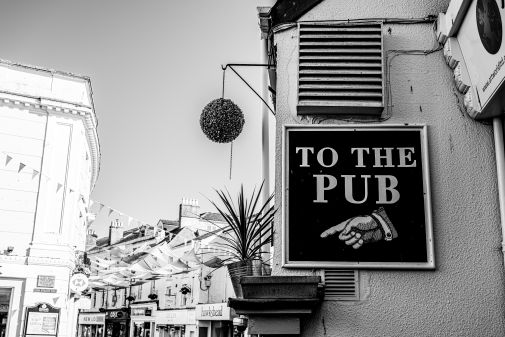Pubs could safeguard their future by creating more collaborative and sustainable pub crawls, according to research by the University of York.
 Protecting British pubs, image by Aurelie Tack on UNSPLASH
Protecting British pubs, image by Aurelie Tack on UNSPLASH
During a time of rising costs and worries over their future, pub crawls are one important way to connect with communities and could be part of a strategic diversification strategy for high streets and hospitality venues looking to increase footfall, the researchers say.
Transformational local economies
The study found that although many pub crawls do have issues with anti-social behaviour - they can prove to be transformational for local economies. And at a time when many pubs are closing, exploring ideas for new pub crawl or pub trail in towns and cities could be so important for the drinks industry which supports more than one million jobs around the country.
Pubs Crawls and Pub Crawlers: A Systematic Literature Review and Consumer Behaviour Analysis is published in the International Journal of Hospitality Management.
Encouraging collaboration
The researchers examined a range of pub crawls from organised events (like the Transpennine Ale Trail) to organic pub crawls developed amongst a group of friends or work colleagues to explore both the potential negatives and positives related to pub crawls. The study found that popular pub crawls could help to draw in visitors at quieter times during the winter and encouraged economic activity through collaboration between venues on the pub crawl.
With pubs in the UK declining in numbers (50 pubs vanish every month), academics are urging publicans to think differently about the potential benefits of pub crawls. Kathryn Arnold, Professor of Ecology at the University of York, worked on the research and said: "Pub survival is so important because pubs are vital in facilitating community cohesion and wellbeing in local communities".
Vital hubs
"Our research shows that pubs are vital social hubs because they foster community connections, supporting local economies, and preserving traditions. Pubs offer a unique space for social interaction, a place to relax, and a venue for community events, making them a cornerstone of British identity. But they are facing such serious economic and social challenges we wanted to explore what could be done to safeguard their future."
The research found that pub crawls may be a way to raise income and potentially slow their decline as well as allowing deeper collaboration between different venues, and other local stakeholders.
A challenging time
Professor Arnold said: "Knowing whether pub crawls would be a potential market to expand, or how and when they should be controlled would be so useful for our pubs and bars. A collaborative approach to understanding footfall across venues and the potential boost to business from well-organised pub crawls could help hospitality venues become more sustainable at such a challenging time."
Figures from the Campaign for Real Ale (CAMRA) reveal 303 pubs across England, Scotland and Wales closed in the first three months of 2025. A further 46 have been converted into other uses. It comes as CAMRA also confirmed that 1,062 pubs were left empty last year after closing.
Community cohesion
Professor Victoria Wells, Professor of Sustainable Management at the University of York, who led the project pointed towards the huge benefits of pub crawls in community cohesion and bringing people together. She said: "Pub crawls offer a unique way to bring people together, there's that sense of exploration and camaraderie which is hard to replicate".
"Our research found they can boost individual happiness by creating opportunities for social interaction, promoting a sense of belonging, and encouraging exploration of local areas and perhaps venues they haven't visited before. They offer a relaxed and informal setting for people to connect, build friendships, and experience shared enjoyment."
Practical recommendations
The research suggested practical recommendations from and best practice in organising or being part of successful and sustainable pub crawls across three phases: 1) pre-crawl 2) on-crawl and 3) post-crawl.
These recommendations produced for the research include:
Effectively managing how pub regulars and pub crawlers interact, perhaps by designating specific areas in the pub or bespoke signage.
Supporting staff with the right training in how to deal with pub crawls and pub crawlers.
Managing drinks promotion to minimise disorder. Researchers believe venue managers should instead offer promotions on food or non-alcoholic drinks to help reduce drunkenness.
Using technology - such as geo-located apps or AI - to manage demand and directing drinkers to less busy venues.
Supporting staff with appropriate time to restock and repair venues post crawl.
Professor Arnold added: "There's so much more to learn about pub crawl culture, which despite demographic changes continues to thrive in the UK. Our research found there is something timeless and universal about pub crawls that hospitality managers need to consider. But for the drinkers themselves, there's nothing more important than their company and the friends they make along the way."











